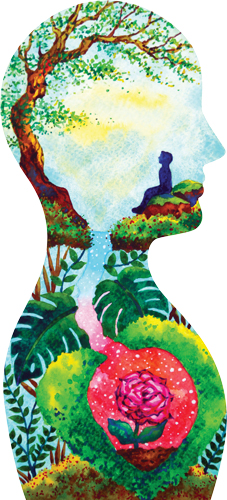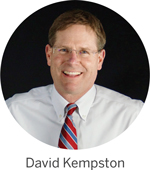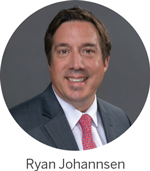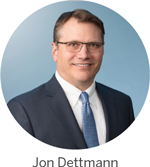 by Lisa Buck
by Lisa Buck
“Faith and prayer are the vitamins of the soul; man cannot live in health without them.”
— Mahalia Jackson
When we think of health, we often envision exercise and eating well (physical health) or stress reduction and therapy (mental health). But a third facet of health— spiritual— is often overlooked. Emerging research indicates that spirituality is as important to our well-being. This article explores what spirituality is and the role it plays in our lives.
What Is Spirituality?
The Oxford dictionary defines spirituality as “the quality of being concerned with the human spirit or soul as opposed to material or physical things.” Spirituality is related to but broader than religion (a set of organized beliefs and practices shared by a group) and means different things to different people.
“Spirituality is deeply connected to purpose,” said Dr. Mary Jo Kreitzer, director of the Earl E. Bakken Center for Spirituality & Healing at the University of Minnesota. “It’s finding meaning in life and applying your values, passions, and abilities for the greater good.”

“I think of spirituality as guiding principles which hold people morally accountable for their actions,” said Assistant Hennepin County Attorney Muteeat Lawal. “I don’t necessarily think that spirituality has to be tied to a religion but can be a mind-set or lifestyle as well.”

“To me, spirituality is a set of principles used to provide structure and a sense of calmness in one’s life,” said Wells Fargo Bank Senior Counsel Samir Islam.
“Spirituality is anything and everything beyond our physical existence,” said Rev. Dr. John F. Ross, senior minister at Wayzata Community Church. “We can tend to our physical and mental health, but unless we invest the same time and effort in our spiritual well-being, we will not be fully whole and healthy.”
Spirituality Promotes Well-Being
Spirituality is increasingly recognized as an essential element of health and healthcare. Research indicates that spirituality can boost immunity, increase optimism, reduce stress, and improve resilience.
“Research shows that having purpose is linked to longevity,” said Kreitzer. “People who believe their existence has meaning have lower levels of cortisol, which affects stress. People without a sense of purpose are at greater risk of mortality.”
According to intuitive energy healer Dana Aschoff, “Healing is, fundamentally, a spiritual process.” Aschoff uses energy therapy to stimulate and clear the energy flow of patients at her Lake Minnetonka-based studio. “When we reclaim our power and energy, we are able to face challenges from a place of balance, strength, and clarity,” she explained.
Palliative care nurse practitioner Christin Ament says that spirituality can affect patient outcomes. “We are learning that having a strong sense of spirituality and positive mind can be a greater healing tool than medicine,” Ament said.
Spirituality helps some people find balance in a stressful profession like the law. “Spirituality is a way for me to recenter,” said Islam. “Even if my work or life presents stress, spirituality helps me to focus my thoughts and search for relative calmness.”
“As a Muslim, it is important to me that I try to maintain peace not only within myself but also in my everyday life,” shared Lawal. “Spirituality keeps me centered and I attribute it to my optimistic outlook on life regardless of the circumstances. Having a positive place to turn to when I’m feeling happy, sad, or even frustrated is essential for me.”

Spirituality can also improve the health of communities. “Native people are reclaiming our cultural practices and spiritual ways,” said Angelique EagleWoman (Sisseton-Wahpeton Dakota Oyate), co-director of the Native American Law and Sovereignty Institute at Mitchell Hamline School of Law. “This is strengthening and healing our communities which have experienced intergenerational trauma.”
Incorporating Spirituality into Your Life
There are many paths to spiritual health and most are related to life purpose, connection with others, and quiet reflection.
Find Purpose
“It is likely that lawyers who find their work fulfilling and connected to issues they care about are more engaged and happier with their work,” said Kreitzer. To identify your life purpose, Kreitzer suggests looking at your talents and values. “What are you passionate about? Match that with the needs of the world.”
“A lot of Native people believe a career is a spiritual calling,” said EagleWoman. “I have a strong spiritual core that gives me strength to speak up and be a voice for my people, which is my purpose.”

David Kempston’s life purpose affects the lens through which he views his career. “I’m here to glorify God, not to make a buck,” said the Mottaz & Sisk litigator. “I’m going to function best when I live as I was created to live. My view is: Be excellent at what you do because it reflects well on God.”
Connect
Spirituality can influence our interactions with and connectedness to others. “I try to make it my mission each day to treat others how they would want to be treated,” said Lawal.

Maslon corporate attorney and mediator Terri Krivosha starts each day with daf yomi, a program of reading and studying a page a day of the Talmud (the primary source of Jewish law). The daf yomi cycle is 7.5 years, after which participants will have read all 2,711 pages of the Talmud. “It anchors me,” Krivosha said. “It also makes me feel connected to a community all over the world of Jews who are learning the same things I am that day.”
“It’s not about me, it’s about serving others,” said Kempston. He tries to make availability a priority. “In the Bible, Christ was available, so I try to be available to others, not just my clients but also younger attorneys and the law students I mentor.”

Ryan Johannsen, a shareholder at Stich Angell, points to Bible verse Galatians 5:14: Love your neighbor as yourself. “Basically, just be kind!” he said. “We are surrounded by a world filled with hate, greed, selfishness, and envy. Practice justice toward your fellow human beings; it will bring unexpected joy.”
Connecting with a higher power through prayer can be a spiritual practice. “Sometimes before an important meeting or contentious court session, I will call on the Creator and my ancestors for inner strength and the ability to make wise decisions,” said EagleWoman. In addition to prayer, she uses smudging, a Native ritual of burning sage in an abalone shell, to purify the air and take away negativity.
On his daily commute to the office, Kempston prays for the day ahead. He also prays throughout the day and considers this an essential part of his relationship with God.
Prayer need not be memorized or traditional. Simply put, it is a conversation. Author Anne Lamott defines prayer as “communication from the heart to that which surpasses understanding.” Lamott distills prayer into three categories: help, thanks, and wow.
Be Still
Disconnecting from devices, tasks, and noise on a regular basis can boost spiritual health.
“A simple daily practice of being quiet and centered can be like putting on a fresh pair of eyeglasses through which we then see the whole world differently for the rest of the day,” said Pastor Ross. “We are human beings but the world tells us that unless we are doing something we have no value. Nothing could be further from the truth. We were created to be and we need to just be, at least for a portion of every day.”
Krivosha disconnects from technology, including her phone, laptop, and car, for 25 hours each week as she observes the Sabbath. Sabbath begins shortly before sunset on Friday. “You can’t negotiate when the sun sets, and I find that comforting,” she said. “When Sabbath starts, I often breathe a sigh of relief for my weekly ‘vacation in time.’ When the Sabbath ends shortly after sunset on Saturday night, I am refreshed and reenergized.”
At the Bakken Center for Spirituality & Healing, Kreitzer advises people to slow down and make time for reflection and introspection. “This can be done while going for a run, walking in nature, or practicing mindfulness,” she said. “Mindfulness does not have to be meditation. It simply means being in the present moment, to tune into our feelings.”

For many people, nature has tremendous healing power. Jon Dettmann, a litigation partner at Faegre Drinker, spends time in nature reenergizing. “The outdoors provides a perspective and connection that is essential nourishment,” Dettmann said, “whether it’s the sound of snowmelt rushing over granite rock, the feel of the strength of a brown trout turning and making a run, or the sight of the sky over a lakeside cliff.”
David Motzenbecker, a certified forest therapy guide with Motz Studios, leads individuals and corporate teams on immersive nature walks based on the Japanese tradition of Shinrin Yoku, or forest bathing. “Forest bathing encourages wellness through intentionality paired with permission to disconnect and be still,” said Motzenbecker. “We have a saying: The forest is the therapist; the guide just opens the doors.”
Conclusion
Consider adding a spiritual practice or two to your life. By identifying your purpose and values, connecting with others, and making time for quiet reflection, you can strengthen your spiritual muscle and enhance your well-being.
.jpg?sfvrsn=131ddd97_2) Lisa Buck
Lisa Buck
buck.lisamarie@gmail.com
Ms. Buck practiced corporate law in Minneapolis and was an adjunct professor at William Mitchell College of Law. When she isn’t writing for the Hennepin Lawyer, you can find her behind the lens at Lisa Buck Photography.